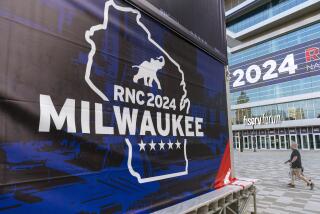Key Israeli Religious Party Softens Stance on Peace Pact : Politics: It will support Labor from outside the ruling coalition but demand consultations on West Bank issues.
- Share via
JERUSALEM — A key opposition party said Monday that it accepts the Israeli-Palestinian peace accord as an irreversible fact and is negotiating an agreement to support the Labor Party from outside the ruling coalition.
The National Religious Party issued a statement after a stormy session Monday night backing its chairman’s declaration that the party must reassess its political platform in the wake of Prime Minister Yitzhak Rabin’s Nov. 4 assassination.
The statement said that the NRP--which has six seats in the Knesset, or Parliament--and Labor have reached a draft agreement under which the conservative NRP will abstain from parliamentary no-confidence motions brought against the left-wing, Labor-led government.
In return, Labor is prepared to consult with the NRP before carrying out the unspecified “further redeployments” from the West Bank that the government promised, in its agreement with the Palestine Liberation Organization, to make next year.
The NRP insisted in its statement that it still opposes the September, 1993, Israeli-Palestinian peace accord in principle but that “nevertheless, the NRP’s view is that any future government will not wage war in order to go back to the cities which we left unless security circumstances or severe violations will necessitate a reaction.”
Given that reality, the party said, it has proposed an arrangement to Labor “with the objective of stopping additional political agreements” before national elections take place next November. The agreement must be approved by the Labor Party Central Committee and Labor’s leftist coalition partner, Meretz, before it can become operative.
The NRP’s statement came one day after its chairman, Zevulun Hammer, called publicly for the party--which has long been identified with the Jewish settlers movement--to modify its opposition to the peace agreement and to work with the government on implementing the accord. Hammer said the NRP must reassess its policies in light of Rabin’s assassination by a right-wing Jewish law student.
“Rabin’s murder has brought us to say: Let’s see if something has really happened in this country--if people are really ready to talk to each other and not let a very small [parliamentary] majority decide crucial issues,” Hammer said.
Leaders of the settlers movement met with the party’s leadership Monday night and expressed astonishment at Hammer’s remarks.
But Prime Minister Shimon Peres said he is encouraged by Hammer’s assessment that the party must modify its policies. Labor also is conducting negotiations with the far-right Tsomet Party, which has five Knesset seats, and with ultra-Orthodox parties.
Peres’ intense wooing of right-of-center parties has infuriated Meretz, but political analysts said Meretz can do little to stop Peres from cutting deals.
“I cannot see them walking out of the coalition. Where would they go?” said Prof. Peter Medding, a political scientist at Jerusalem’s Hebrew University. “A Labor-led government is the best government that Meretz could hope for.”
Securing the support of one or more of the right-wing parties would offer Peres several advantages, political analysts say. He could stabilize his government, which now relies on Arab parties to give it a narrow majority of 63-57 in the Parliament. He could silence critics who say that the government is making momentous decisions without support from any right-of-center parties.
Peres also could further isolate the Likud, the largest opposition party, by gaining the support of some of the Likud’s onetime allies. Likud Party Chairman Benjamin Netanyahu has pleaded in vain with the NRP and Tsomet to stop their talks with Labor.
By reaching out to some of the right-wing parties, Peres also bolsters his role as national peacemaker, a role he assumed just days after Rabin was gunned down by 25-year-old Yigal Amir, who said he shot the prime minister to torpedo the Israeli-Palestinian peace accord.
Even as some of his Labor Party colleagues were angrily threatening to “crush” the religious-nationalist camp in the wake of the assassination, Peres quietly sent out feelers to the NRP.
The NRP would be a big prize for Peres, particularly if he could somehow persuade the party--or parts of it--to actually join his government. Peres has for years argued within Labor that the party should seek to rebuild its historic alliance with the NRP, which served as a major coalition partner in successive Labor governments from the founding of the state until 1977, when the Likud dislodged Labor from power and formed a government with the NRP.
Peres appears to be trying to rebuild the Israeli political center that began to disintegrate after the June, 1967, Arab-Israeli War. At that time, the NRP became increasingly wedded to the Jewish settlement movement in the West Bank, and religious parties upped the ante of funding and social concessions as the price for their participation in any government.
For nearly 30 years, the gulf has grown deeper between religious and secular Israelis, between those who see themselves as the “nationalist” camp that resists territorial compromise and those who are willing to trade land for peace.
Medding and other political analysts said Peres is taking advantage of a combination of real soul-searching and pragmatic political calculations by the NRP in the wake of Rabin’s assassination.
More to Read
Sign up for Essential California
The most important California stories and recommendations in your inbox every morning.
You may occasionally receive promotional content from the Los Angeles Times.













